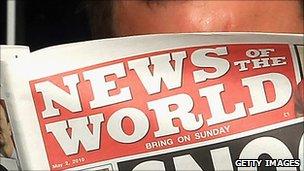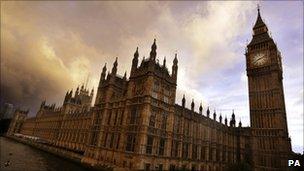Phone-hacking: Tabloid culture on trial
- Published
- comments

The police are investigating allegations that families of 7/7 victims had their phones hacked by the paper
The editor of the Times James Harding writes this morning, external that "journalists are now in their version of the MPs' expenses scandal". We all know how that ended up: a number of (dishonourable) members behind bars and many more obliged to admit they had profited from rule-bending and breaking.
But what the scandal also did was inspire a period of national soul-searching about Parliament itself: its behaviour; its integrity; its morality. The very culture of our politics was questioned.
If Mr Harding's analogy is correct, the hacking story may also spread beyond the shocking and possibly criminal antics of a few, to engulf popular journalism generally, with probing questions about its behaviour, integrity and morality. Tabloid culture may soon be on trial.
Some will say, not before time. The enormous power of the red tops to make or break individuals, to shape the national conversation, to influence our democracy comes, it is argued, without equivalent accountability.
It will be a strange feeling for Rebekah Brooks and Andy Coulson to encounter a baying pack of hacks outside their front doors knowing that they have instigated the same tactics on so many others over the years.
Holding the powerful to account is one of the central justifications for tabloid intrusion, and so there is an irony in the way the telephoto lens is now swinging around to face the other way.
James Harding offers a definition of the "public purpose of journalism" in today's Times leader.
He writes of "the nobility of the trade of reporting the truth, the better to inform the readers" and of his faith in "the contribution of vibrant comment to a raucous and well-informed democracy".
Profit over principle
In all honesty, though, how many readers of Britain's red tops feel "the nobility of the trade of reporting the truth" sits in their hands?
There is much brilliant and vital journalism in the tabloids but on almost any domestic issue debated, I encounter the view that "the press" is part of the problem not the solution.

Public opinion of MPs reached a new low when their expenses were leaked to a national newspaper
Blaming the messenger is one thing, but the criticism is that newspaper editors are more intent on playing to the prejudices of their readers (and their owners) than the noble pursuit of truth; that they are more concerned about profit than principle.
Critics moan that too often the tabloids operate in a parallel morality governed by one simple rule: "Never let the facts (or scruples) get in the way of a good story."
The Press Complaints Commission, now complaining it has been "misled" over the hacking scandal, appears an ineffective brake on such tabloid excesses.
With some senior MPs suggesting Parliament was also "misled" in evidence to select committees, another back-stop for press accountability has arguably proven inadequate.
But the debate may extend beyond whether, as James Harding puts it, "a line has been crossed" in the tactics used by some newspapers, and whether the system of accountability needs beefing up.
The question could become much broader: has the uncompromising, aggressive, no-holds-barred culture that has driven popular journalism in this country for decades finally had its day?